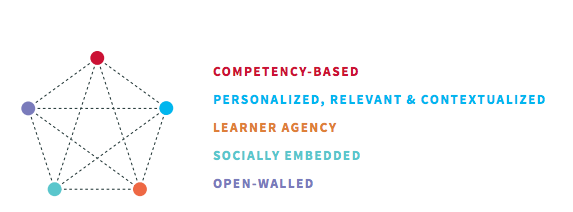In the Deerfield Public Schools, District 109, we have decided to make a change to mathematics program delivery models starting in

the 2017-18 school year in the 6th grade. We are going to eliminate “regular math” and offer “accelerated math” for all.

This equitable math curriculum delivery model change is based upon a substantial body of educational research, two years of our student performance data analyzed by professional psychometricians, and our unified, ongoing desire to create and sustain the most effective and proven structures for student learning possible.

- Strategic Planning Update: Board of Education President Nick Begley commended his fellow Board members and the administrators for a productive strategic planning meeting on Saturday, January 21. Dr. Lubelfeld reported that the District gathered input from more than 1,700 people as part of the process. He explained that the strategic planning process is an opportunity for stakeholders provide guidance to the Board to set the path of the District. The District 109 Board reviewed all the input and worked with ECRA in a half-day workshop to develop a draft plan that includes the mission, vision, portrait of a graduate, guiding principles, goals and objectives. The administrative team will meet on January 31 to review the objective statements as they begin to plan the action plans to meet the objectives and goals. At the February 13 Committee of the Whole meeting, the Board and administrative team will meet to bring together their work. The final plan will be presented to the Board for action at the March 20, 2017 meeting.

- What do we expect our children to know and be able to do? (As mentioned before, with this change the answer will be the same: the 6th grade CCSS for mathematics will be the floor for all students and the ceiling for none).
- How will we know if they learned it? (Again, largely nothing will change; we will continue to use MAP, PARCC, DCA, and ongoing daily formative assessment data to monitor our results)
- How will we respond when some children do not learn? (Our answer to this question, based on all available data the past two years, is the “why” of this whole movement. This is something we’ve examined extensively and–having done so–determined we must now respond systemically; something must change to determine if we can get better results moving forward)
- How will we respond when some students already know/can do? (We want to spend more time on answering this question next year with the acceleration for all model, in which we insist on 6th standards as floor for all, yet the ceiling for none. How can we individualize/personalize 6th grade math instruction to make sure the ceiling is limitless for kids)
Internally we shared some of the following background information and resource collection:
There has been a lot of discussion, thinking, review and reflection about the administration’s goal to reduce tracking at the sixth grade math level next year. Our aim is to raise expectations and remove limits to student growth by making all or just about all math (except TAP/gifted) accelerated. Our “acceleration for all” philosophy is driven by research, best practices, literature, experience, professional judgement, resources available to us, and the performance on the achievement test of children in the “regular” class for the past two years. One hypothesis for the poor performance is the ill effects of ability grouping/tracking as has been in place. In addition, the past few years offers us incredible gains and growth – never before seen or experienced in the district. Our student performance K-5 is impacting needed changes in models at grades 6-8.
Please see these videos for perspectives from experts on tracking and ability grouping:
-
Jo Boaler –Maths Ability Grouping
-
John Hattie on Ability Grouping
-
Ford Foundation-Ability Grouping, Tracking, and Grouping Alternatives
This is a complex and multifaceted issue that tracking alone does not explain. We believe that raising expectations for all students in the current “regular track” will improve student performance.
Additional literature/research information on this well researched topic:
According to Mary Fletcher, there are many benefits to expect when instructional staff are conversant with and dedicated to differentiated instruction and detracking:
-
Differentiation allows more students to feel invested in the lesson, thereby decreasing behavioral problems. Students who previously opted to be viewed as “bad” rather than “stupid” will have their learning needs met and other talents explored, allowing them to drop the “bad” act and become instead a valuable member of the class.
-
Students who might have been considered less intelligent because they learn in a nontraditional way become invaluable contributors to the heterogeneous classroom.
-
Differentiated instruction encourages flexibility. Teachers thus become adept at adapting lessons to fulfill each student’s individual needs.
-
Detracking removes the limits that come with rigid thinking about how learning should and does occur. Fair does not always mean “the same.” For example, allowing a student who struggles with the physical act of writing to type his notes can benefit that student and the rest of the class. Not only does the student get access to the material, but the entire class has a reliable set of notes that can be used for those who were absent. This student now becomes an expert—and essential—note-taker who takes pride in his responsibility and sees himself as a member of the class.
Eliminate the Lowest Track First
There is little doubt that tracking does the most harm to students who are consigned to the lowest track. According to the National Research Council (NRC), low-track classes have an especially deleterious effect on learning, since such classes are “typically characterized by an exclusive focus on basic skills, low expectations, and the least qualified teachers” (Heubert & Hauser, 1999, p. 282).
The preponderance of research regarding low-track classes was so overwhelmingly negative that the NRC concluded that students should not be educated in low-track classes as they are currently designed (Heubert & Hauser, 1999). It makes sense, therefore, to begin by eliminating the classes that do the most harm to students.
Why Ability Grouping Doesn’t Work by Shirley Clarke
Detracking for Excellence and Equity compilation of research findings from several sources
Moving Beyond Tracking by Wm Mathis
From: The Mathematics of Hope: Moving from Performance to Learning in Mathematics Classrooms– Jo Boaler:
Other changes need to happen as well. Mathematics teachers need to stop frequent, timed testing; replace grades with diagnostic feedback (Black et al. 2002; Boaler & Foster 2014); and deemphasize speed, so that the students who think slowly and deeply are not led to believe they are not capable (Boaler, 2014). Perhaps most significantly and most radically, schools should also remove fixed student groupings that transmit fixed mindset messages and replace them with flexible groupings that recognize that students have different strengths at different times (Boaler 2009; Boaler & Foster 2014).
Keeping Track: The Policy and Practice of Curriculum Inequality (Oakes)
Current DPS 109 5th Grade Data to review for Placement Discussions
Potential Resources for teachers:
Jo Boaler’s Online course for Teachers
Why Do Americans Stink at Math by Elizabeth Green
The American Math Crisis– Forthcoming Math Documentary
The Stereotypes that Distort How Americans Teach and Learn Math by Jo Boaler
How Math Should Be Taught – Jo Boaler
When You Believe In Your Students They Do Better -Jo Boaler
